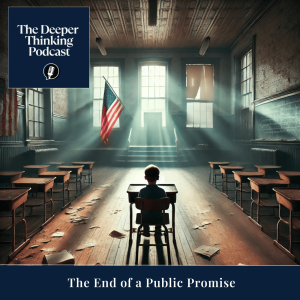
Friday Mar 21, 2025
The End of a Public Promise - The Deeper Thinking Podcast
There was never a promise, only a rehearsal of one.
In the center of a town that no longer funds its own library, a bell rings in an empty school hallway. Dust moves where children once did. The flag outside still rises every morning—mechanically, unseen. Once, public education was tied to something mythic: the classroom as hearth, the teacher as steward of a shared world. But the quiet disassembly of the institution reveals another belief taking root—that knowledge, like property, belongs only to those who can pay for it.
Hannah Arendt described education as the place where the young are introduced to the world we’ve built. Not to mold them, but to offer grounding. Without that gesture, the world becomes unrecognizable—not just to the child, but to the adult as well. The dismantling of the Department of Education isn’t just a policy shift. It signals a psychic unraveling. When a state withdraws from teaching its own future, it doesn’t just lose control. It gives up the very idea of a shared tomorrow.
The blackboard has changed. Once covered in chalk dust and tentative handwriting, now it’s a touchscreen, a gated portal, or a blank space. Foucault’s questions echo: who controls the curriculum, and by what logic is memory preserved or erased? Without national standards, there's no map—only competing mythologies. The past becomes a battleground. A child in one district reads Toni Morrison under buzzing fluorescent lights. In another, her name is banned. Knowledge fractures, becomes regional, unstable. The nation splinters into echo chambers, each with its own syllabus.
The scent of worn paper. A hand raised without certainty. The squeak of a chair leg on linoleum. The click of a projector. The hush of fluorescent light. The breath between question and answer. A textbook buried in a backpack. A red mark circling a misspelled word.
Dewey saw the school as a miniature republic, where democracy lived through shared work and collective resources. But democracy is slow. Expensive. And so it’s replaced—by performance metrics, by market logic. The child becomes both product and consumer. Parents’ rights turn corporate. Vouchers become exit strategies. The school, once public, becomes private by neglect. Not by law, but by absence. Buses stop running. Teachers don’t return. Funding never arrives. What was once a right is now a bid.
Education becomes a house without a floor. bell hooks warned of this: without structure, liberation becomes a slogan. Critical thought needs scaffolding—material, emotional, intellectual. Independence doesn’t grow in isolation. Thought needs infrastructure. Heat in the winter. Chairs that don’t collapse. Time to think. Safety to be bored. Without that, imagination becomes another name for longing. And longing becomes another name for loss. Liberation buckles under the weight of unpaid bills and pre-cut lessons.
The school is dead. The school is not dead. It moves in other forms—muted Zoom calls, homeschool pods, ideologically tailored microschools. But these are symptoms, not systems. They cannot hold a nation together. The common world cannot be split by zip code. A republic cannot be sewn from curriculum wars and culture panics. But still, it’s being stitched—unevenly, invisibly, without thread.
Beneath every budget cut lies a belief: the child does not belong to the collective. Education is not inheritance, but transaction. Tomorrow’s mind is not worth today’s tax.
This is abandonment.
Once, the bell tower signaled beginnings—arrival, gathering, belonging. Now it rings into emptiness. The bell still rings. It rings for no one. It rings anyway.
No comments yet. Be the first to say something!